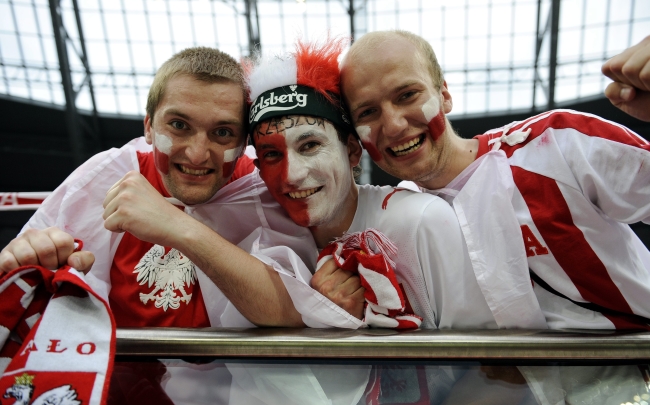
photos - EPA/BRIAN STEWART UEFA
by Peter Gentle
The cameras scan the crowds at Euro 2012 stadiums in Poland picking out good lookin' women – lots of good lookin' women - kids with painted faces, dads waiving the red and white scarves of the Polish team. They are making lots of noise and, what one sports journalist, who was at the Poland versus Russia match at Warsaw's National Stadium, told me was “one of the best atmospheres he has ever experienced at an international football match”.
Very different scenes, then, to the ones depicted by the BBC in their Panorama documentary. I did point out in a previous post that the crowds that would be at Euro 2012 matches would not be the same ones – with the same nut-ball 'ultras' - who starred as the anti-heroes in Stadiums of Hate.
Despite Polish politicians complaining that the BBC had managed to concoct a poisonous, and slanderous, image of their country - two weeks before hundreds of thousands of foreigners would be coming to Poland - Euro 2012 started well for the non-football journalists who descended in Krakow, where the England team are based, when monkey chants were allegedly directed at black Dutch players at an open training session.
The Netherlands squad heard this at a training session attended by 25,000 people at the Wisla Krakow stadium, one of the clubs featured in the BBC documentary.
British journalists picked up the scent. One hack from a UK tabloid wanted one of our journalists to put him in contact with “an extremist”. Our journalist, a nice, cuddly kind of guy who is particularly interested in culture stories, politely told the probably salivating journo, with his nose on 'the story', that he “really doesn't know any extremists. Sorry”.
Interest in the Group A Poland versus Russia match was another peak for non-footballing related stories here during Euro 2012. Polish hooligans helped provide photojournalists with the necessary images of a 'conflict between old enemies', as they tried to 'defend their turf' against 5,000 Russian fans who were allowed to march, with huge police accompaniment, across a bridge in Warsaw to the National Stadium. Scuffles broke out and over 100, Poles, plus Russians and a few other random nationals, were arrested.
The hooligans, however, were not at the match, where 50,000 people were having the best night of their lives, cheering on a Polish team which held Russia to a 1 – 1 draw. It would be the high point of the tournament for Poles, who went out of Euro 2012 after failing to beat their neighbours, the Czechs. Ouch!
Racism has failed to emerge however among the joyous scenes at what have been tremendous matches so far in the tournament – apart from a complaint against a few Croatian fans for the signature 'monkey chanting' at one match. The Polish, and Ukrainian, ultras have yet to make their sinister appearance.
In our Dateline Warsaw programme, this week, there was a consensus among the journalists that it was good of the BBC documentary to show the depravity that is going on sometimes in football stadiums in Poland and Ukraine among the 'ultras'. The clubs, the Polish football association, and UEFA, have been aware of this for a long time and have seemingly done little to stop it.
But the guests on the programme also agreed that Stadiums of Hate gave the impression of being an example of the type of journalism that decides what the story is in pre-production, and then cherry picks what it presents to back up the story. It wasn't interested in the fact that the ordinary Pole is like the ones you have seen as the cameras scan the Euro 2012 crowds in search of the good lookin' women. No idiots there, just many people wearing funny hats.
Jonathan Ornstein, director of the Jewish Community Centre in Krakow – who was featured in the BBC documentary – has complained of the usual tactics of this type of journalism. He wasn't told the title of the documentary, for instance, nor its predetermined conclusion: “don't go to Euro 2012 or you might come back in a coffin”.
Ornstein also told the spiked online magazine in the UK this week the BBC documentary makers left lots on the cutting room floor.
"They spoke to people with different opinions. And yes, there are problems within the stadia, there is [anti-Semitic] graffiti. But they also spoke to people with different perspectives. They spoke to the prosecutor in [the city of] Łódź; they spoke to someone in the police department, they spoke to an Israeli football player who’s playing in Warsaw. And they didn’t include those things. They didn’t include anything that didn’t fit with what it was they wanted to show.”
In short, a disappointing documentary which led many to believe that Warsaw's spanking new arena, and the ones in Wroclaw, Poznan and Gdansk, were stadiums waiting to hate.
PS – I did a few interviews late night on UK media around the time of the Poland versus Russia match, and easily the most intelligent questioning, and best and most courteous production staff, was at the BBC World Service.